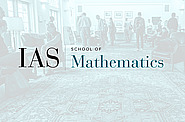2007-2008 seminars
Feb
19
2008
Computer Science/Discrete Mathematics Seminar II
New Results and Open Problems in Computing Nash Equilibria
Christos Papadimitriou
10:30am|S-101
Feb
18
2008
Computer Science/Discrete Mathematics Seminar I
Integrality Gaps for Sherali-Adams Relaxations
Yury Makarychev
11:15am|S-101
Feb
12
2008
Computer Science/Discrete Mathematics Seminar II
Efficient Algorithms for Some Algebraic Problems
10:30am|S-101
Feb
11
2008
Computer Science/Discrete Mathematics Seminar I
Uniform Direct Product Theorems: Simplified, Optimized, and Derandomized
11:15am|S-101
Feb
05
2008
Computer Science/Discrete Mathematics Seminar II
Arithmetic Complexity -- The Power of Partial Derivatives
10:30am|S-101
Jan
29
2008
Computer Science/Discrete Mathematics Seminar II
Arithmetic Complexity -- The Power of Partial Derivatives
Avi Wigderson, IAS
10:30am|S-101
Jan
28
2008
Computer Science/Discrete Mathematics Seminar I
Hardness Amplification Proofs Require Majority
11:15am|S-101
Jan
22
2008
Jan
21
2008
Computer Science/Discrete Mathematics Seminar I
Noisy Binary Search and Applications
Avinatan Hassidim
11:15am|S-101
